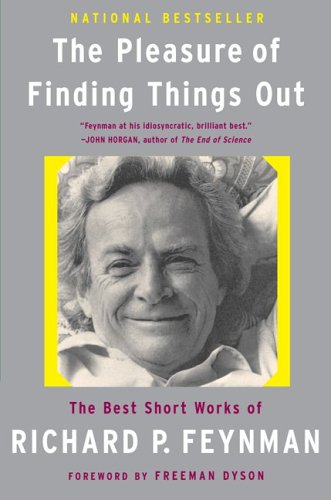Books, Brochures, and Chapters>Book Chapter: Feynman, Richard (1969), What Is Science?, The Physics Teacher, Vol 9, pp 313-320, American Association of Physics Teachers, Retrieved on 2010-11-13
Memes
03 JAN 2011
 The Evolution of Culture
The Evolution of Culture
What science is, I think, may be something like this: There was on this planet an evolution of life to the stage that there were evolved animals, which are intelligent. I don't mean just human beings, but animals which play and which can learn something from experience (like cats). But at this stage each animal would have to learn from its own experience. They gradually develop, until some animal coudl learn from experience by watching, or one could show the other, or he saw what the other on...Although Feynman calls it "time-binding," this sounds very much like memetics.
03 JAN 2011
 The Danger of Culture and Science as the Solution
The Danger of Culture and Science as the Solution
This phenomenon of having a memory for the race, of having an accumulated knowledge passable from one generation to another, was new in the world. But it had a disease in it. It was possible to pass on mistaken ideas. It was possible to pass on ideas which were not profitable for the race. The race has ideas, which were not profitable for the race. The race has ideas, but there are not necessarily profitable.
So there came a time in which the ideas, although accumulated very slowly, were all ...Science is the cure for erroneous memes that enter our culture.
03 JAN 2011
 The Beauty of Science
The Beauty of Science
The world looks so different after learning science. For example, the trees are made of air, primarily. When they are burned, they go back to air, and in the flaming heat is relased the flaming heat of the sun which was bound in to convert the air into trees, and in the ash is the small remnant of the part which did not come from air, that came from the solid earth instead.Folksonomies: science ionian enchantment
Folksonomies: science ionian enchantment
We can see the world much more deeply after learning science.
03 JAN 2011
 Science is Patient Observation
Science is Patient Observation
I think it is very important--at least it was to me--that if you are going to teach people to make observations, you should show that something wonderful can come from them. I learned then what science was about. It was patience. If you looked, and you watched, and you paid attention, you got a great reward from it (although possible not every time). As a result, when I became a more mature man, I would painstakingly, hour after hour, for years, work on problems--sometimes many years, sometim...Folksonomies: science scientific virtues
Folksonomies: science scientific virtues
Wonderful things can come from watching the world patiently.
03 JAN 2011
 The Energy Game
The Energy Game
My father dealth a little bit with energy and used the term after I got a little bit of the idea about it. What he would have done I know, because he did in fact essentially the same thing--though not the same example of the toy dog. He would say, "It moves because the sun is shining," if he wanted to give the same lesson. I would say "No. What has that to do with the sun shining? It moved because you wound up the springs."
"And why, my friend, are you able to move to wind up this spring?"
"I...A game Feynman's father would play with him, asking what made things work, and following the chain of energy back to the sun.
Parent Reference

Books, Brochures, and Chapters>Book: Feynman, Richard and Robbins, Jeffrey (1999), The Pleasure of Finding Things Out, MJF Books, New York, NY 10001, Retrieved on 2010-11-07
Folksonomies: enlightenment science 



